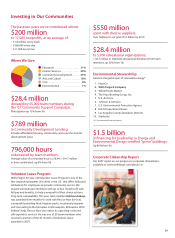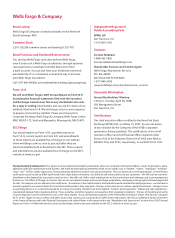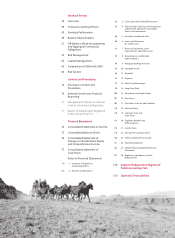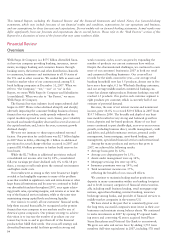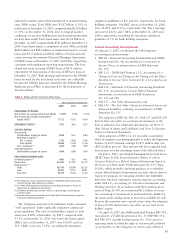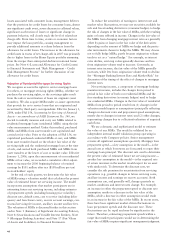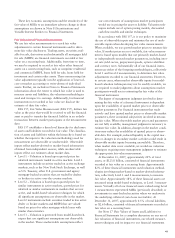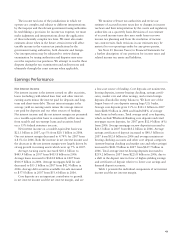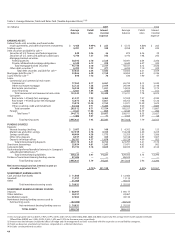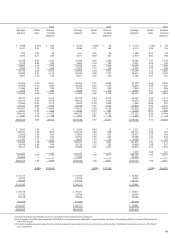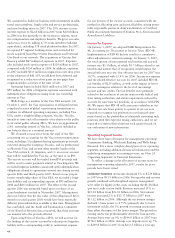Wells Fargo 2007 Annual Report Download - page 41
Download and view the complete annual report
Please find page 41 of the 2007 Wells Fargo annual report below. You can navigate through the pages in the report by either clicking on the pages listed below, or by using the keyword search tool below to find specific information within the annual report.38
(a payable), against derivative instruments executed with the
same counterparty under the same master netting arrangement.
The provisions of this FSP are effective for the year beginning
on January 1, 2008, with early adoption permitted. We adopted
FSP FIN 39-1 on January 1, 2008, and it did not have a
material effect on our consolidated financial statements.
On September 20, 2006, the FASB ratified the consensus
reached by the EITF at its September 7, 2006, meeting
with respect to Issue No. 06-4, Accounting for Deferred
Compensation and Postretirement Benefit Aspects of
Endorsement Split-Dollar Life Insurance Arrangements (EITF
06-4). On March 28, 2007, the FASB ratified the consensus
reached by the EITF at its March 15, 2007, meeting with
respect to Issue No. 06-10, Accounting for Collateral
Assignment Split-Dollar Life Insurance Arrangements (EITF
06-10). These pronouncements require that for endorsement
split-dollar life insurance arrangements and collateral split-
dollar life insurance arrangements where the employee is
provided benefits in postretirement periods, the employer
should recognize the cost of providing that insurance over
the employee’s service period by accruing a liability for the
benefit obligation. Additionally, for collateral assignment
split-dollar life insurance arrangements, EITF 06-10 requires
an employer to recognize and measure an asset based upon
the nature and substance of the agreement. EITF 06-4 and
EITF 06-10 are effective for the year beginning on January 1,
2008, with early adoption permitted. We adopted EITF 06-4
and EITF 06-10 on January 1, 2008, and reduced beginning
retained earnings for 2008 by $20 million (after tax), pri-
marily related to split-dollar life insurance arrangements
from the acquisition of Greater Bay Bancorp.
On November 5, 2007, the Securities and Exchange
Commission (SEC) issued Staff Accounting Bulletin No. 109,
Written Loan Commitments Recorded at Fair Value Through
Earnings (SAB 109). SAB 109 provides the staff’s views on
the accounting for written loan commitments recorded at
fair value under U.S. generally accepted accounting principles
(GAAP). To make the staff’s views consistent with current
authoritative accounting guidance, SAB 109 revises and
rescinds portions of SAB 105, Application of Accounting
Principles to Loan Commitments. Specifically, SAB 109 states
the expected net future cash flows associated with the servicing
of a loan should be included in the measurement of all written
loan commitments that are accounted for at fair value
through earnings. The provisions of SAB 109, which we
adopted on January 1, 2008, are applicable to written loan
commitments recorded at fair value that are entered into
beginning on or after January 1, 2008.
On December 4, 2007, the FASB issued FAS 141R,
Business Combinations. This statement requires an acquirer
to recognize the assets acquired (including loan receivables),
the liabilities assumed, and any noncontrolling interest in the
acquiree at the acquisition date, to be measured at their fair
values as of that date, with limited exceptions. The acquirer
is not permitted to recognize a separate valuation allowance
as of the acquisition date for loans and other assets acquired
in a business combination. The revised statement requires
acquisition-related costs to be expensed separately from the
acquisition. It also requires restructuring costs that the acquirer
expected but was not obligated to incur, to be expensed
separately from the business combination. FAS 141R should
be applied prospectively to business combinations beginning
with the first annual reporting period beginning on or after
December 15, 2008. Early adoption is prohibited. We are
currently evaluating the impact that FAS 141R may have on
our consolidated financial statements.
On December 4, 2007, the FASB issued FAS 160,
Noncontrolling Interests in Consolidated Financial
Statements, an amendment of ARB No. 51. FAS 160 specifies
that noncontrolling interests in a subsidiary are to be treated
as a separate component of equity and, as such, increases
and decreases in the parent’s ownership interest that leave
control intact are accounted for as capital transactions. It
changes the way the consolidated income statement is pre-
sented by requiring that an entity’s consolidated net income
include the amounts attributable to both the parent and
the noncontrolling interest. FAS 160 requires that a parent
recognize a gain or loss in net income when a subsidiary is
deconsolidated. This statement should be applied prospectively
to all noncontrolling interests, including any that arose before
the effective date. The statement is effective for fiscal years,
and interim periods within those fiscal years, beginning on
or after December 15, 2008. Early adoption is prohibited.
We are currently evaluating the impact that FAS 160 may
have on our consolidated financial statements.


